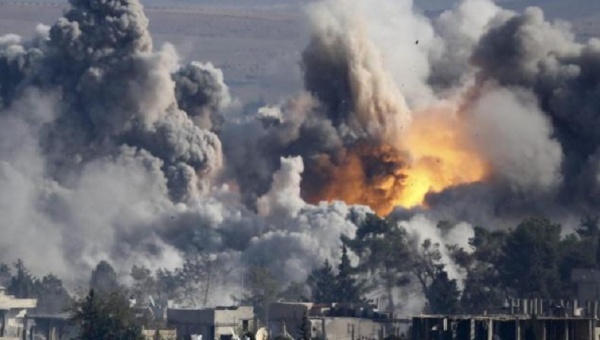US Must Help Syrian Rebels To Blunt Russia, Terrorists
Posted on

Russia bombs Syrian targets
The battle of freedom and democracy versus authoritarianism repeats time and time again: World War II, the Cold War, the Arab Spring. Now, the setting is Syria, where moderate, pro-democracy rebels have been lashing out against the brutal dictatorship of Syrian President Bashar al Assad for over six years.
How did we get to this point? Nature abhors a vacuum, and for the past eight years, we’ve had nothing but tired rhetoric and broken promises from the Obama Administration. It should come as no surprise that authoritarianism and terrorists have moved to fill that vacuum.
 Syria’s sad and bloody history is clear. In 2011, pro-democracy protestors began demonstrations in Syria, only to be violently oppressed by Assad’s security forces. The situation devolved into a civil war, with Assad’s government forces brutally murdering those who dare to stand in dissent to his regime. The Obama Administration has failed to provide any meaningful support, training, or assistance to the pro-democracy forces, leading to radical and extremist views permeating some rebel factions.
Syria’s sad and bloody history is clear. In 2011, pro-democracy protestors began demonstrations in Syria, only to be violently oppressed by Assad’s security forces. The situation devolved into a civil war, with Assad’s government forces brutally murdering those who dare to stand in dissent to his regime. The Obama Administration has failed to provide any meaningful support, training, or assistance to the pro-democracy forces, leading to radical and extremist views permeating some rebel factions.
Then, in October 2015, Assad found a new ally—an aggressive Russia. Vladimir Putin’s regime has provided air support and weapons to the authoritarian dictator. As a result, Aleppo has fallen back into government control. This month, Russia, Turkey, and Iran have planned a summit to discuss the future of Syria. The United States was not invited. Secretary of State Kerry even stated he was not concerned that there would be no U.S. involvement, confirming his weakness.
Russian air strikes in Aleppo have targeted rebel groups and Putin’s forces have even been accused of attacking civilian resources, including schools and hospitals. The prolonged siege (the longest in modern times) has prevented humanitarian assistance from reaching innocent civilians and has reduced one of the oldest cities in the world, populated by millions, to rubble.
While the human rights concerns are substantial—we simply cannot afford to back away from democratic reform and give in to Assad’s authoritarianism. An Assad regime weakens our fight in the Global War on Terrorism because it allows Russia to extend its influence and control across the Middle East, threatening long-standing U.S. interests.
If we allow Russia to exert and extend its influence in the Middle East it will be to the detriment of U.S. interests. Assad knows too well that his power is contingent on support from Russia and Iran. The lack of U.S. action has also driven Turkey to a new and closer relationship with Russia. The Turkish alliance has been Obama’s to lose, and, with its loss, comes a lot more than the loss of a long-time member of NATO—we lose a critical partner in the Global War on Terrorism.
While Putin would have the international community believe that Russia’s military involvement in Syria is limited to killing ISIL fighters, the facts tell a different story. Bombs are repeatedly being dropped in rebel controlled areas. It should also come as no surprise that Russia is one of Syria’s biggest arms suppliers—with contracts estimated to be in the billions.
There are some who would question any U.S. intervention in Syria. They advocate working with Assad as a known quantity instead of supporting moderate rebels that we know less about. There are security concerns about supporting the rebels. We should implement a method to vet those we wish to support, rather than just giving up. Talented and experienced NATO allies have proven capabilities of training and equipping.
Conceding Syria to Assad’s continued human rights abuses and tyranny means allowing Russia and Putin to have a base and to be a disruptive world power in the Middle East for years to come. We must support the moderate, vetted Syrian rebels and give them the opportunity for democracy. It is a three-for-one benefit—promote democracy, check Putin’s power and prevent attacks by extremist terrorists, thus protecting American families at home and abroad.
Doing nothing in Syria degrades our efforts in the Global War on Terrorism. The prolonged conflict provides a safe haven for terrorists and hurts the moderate rebels. The rebels have to not only fight against the tyrannical government, but must battle the extremists who would use the disorder of the civil war to strengthen the influence and territory of the Islamic State of Iraq and the Levant (Daesh), al Qaeda and other terrorist organizations.
I appreciate that Americans may hesitate to get involved in what is perceived as another foreign entanglement. As a veteran myself and the father of four sons who have served in the Middle East, the call for increased U.S. involvement in Syria is not something I take lightly. Congress has taken action to support the moderate Syrian rebels, but we are still reliant on our Commander in Chief to act—and for eight long years we’ve had one who is content to stand on the sidelines. Fortunately, this year, that will change.
From the days of our own revolution in 1776, our foreign policy has been squarely on the side of enabling citizens of other nations to enact their own democratic change. We can take appropriate action to make a positive, democratic difference without long-term involvement.
By approaching the Syrian conflict from a position of strength, I am confident that the U.S. can restore our tradition of principled global leadership and effectively continue our successful Global War on Terrorism which is crucial to stop safe havens overseas to protect American families at home.
Subscribe to our newsletter
Promotions, new products and sales. Directly to your inbox.
